Lowell and Lincoln’s Assassination
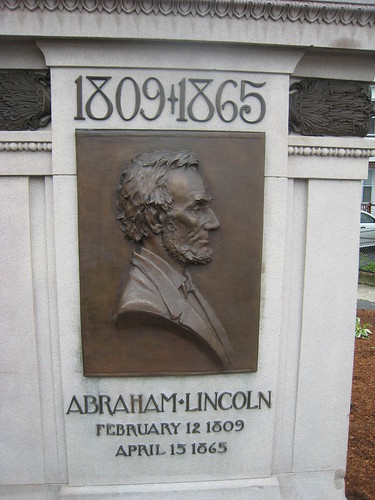
Abraham Lincoln Monument, Lincoln Square, Lowell, Mass.
On April 14, 1865 – Good Friday – Abraham Lincoln went to Ford’s Theatre. As he watched the play from his presidential box above the stage, John Wilkes Booth shot him in the back of the head. Lincoln was carried out of the theatre and across the street to William Petersen’s boarding house. There, they lay the barely-alive president in the nearest bed, one usually occupied by 23-year old William Clark. Lincoln never regained consciousness and died a few hours later, early in the morning of Saturday, April 15, 1865. (Coincidentally, the calendar cycle has the anniversary of Lincoln’s shooting and death, falling on Good Friday and the following Saturday, just was in 1865).
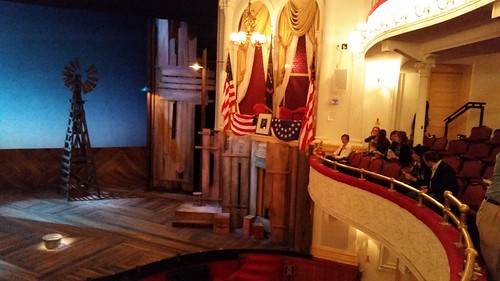
President’s Box at Ford’s Theatre
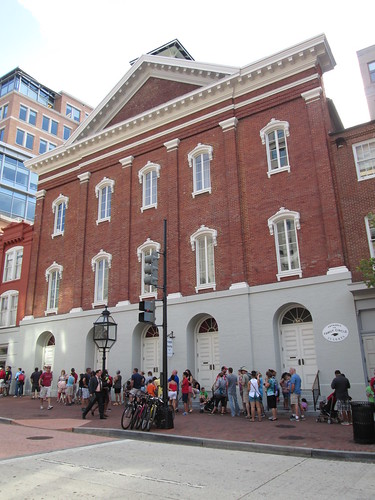
Ford’s Theatre
Like so much else that happens in the world, there was a Lowell connection to Lincoln’s assassination. That would be William Clark.
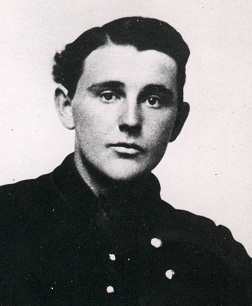
William Clark of Lowell, Mass.
Clark was born in Lowell in 1842. His father, Tilton Clark, worked for the Boston & Lowell Railroad, and died the year after his son’s birth in a fatal work accident at the railyard. In April 1861, William enlisted in the Union Army and served through most of the war. Due to illness, he was discharged from his regiment but he obtained work as a clerk in the War Department in Washington. He rented a room in William Petersen’s boarding house on Tenth Street, just across from Ford’s Theatre.
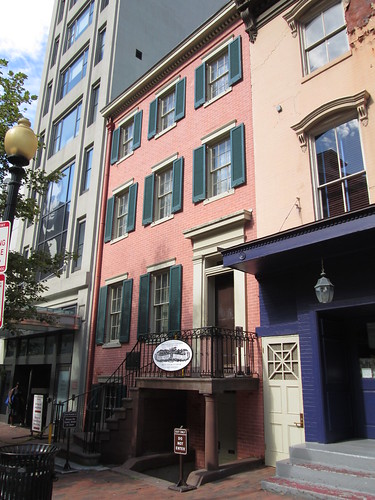
Petersen House
Clark was out on the evening of April 14, 1865. He returned home to find great commotion at the Petersen house and was unable to get to his room.
After President Lincoln expired, his body was removed from Clark’s room and everyone departed. But as Clark related in a letter to his sister in Lowell just a few days later, his room had become a type of national shrine. Here is some of what he wrote:
Since the death of our president hundreds daily call at the house to gain admission to my room. Everybody has a great desire to obtain some memento from my room so that whoever comes in has to be closely watched for fear that they will steal something.
William Clark moved back to Lowell and then relocated to Boston where he became a real estate agent. He died in 1888 at age 46 of heart failure.
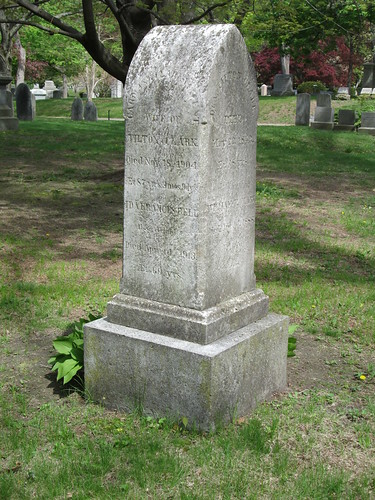
Clark Family grave, Lowell Cemetery
One additional Lowell connection to Lincoln’s assassination: Lowell’s Ladd & Whitney Monument, the granite obelisk that sits in front of Lowell City Hall and which commemorated Luther Ladd and Addison Whitney, two young soldiers from Lowell who are considered the first soldiers to die from hostile fire in the American Civil War, was to be dedicated on April 19, 1865 – the fourth anniversary of the Baltimore riot in which they lost their lives. Due to Lincoln’s death, the dedication ceremony in Lowell was postponed. It was eventually held on June 17, 1865, the anniversary of the battle of Bunker Hill.
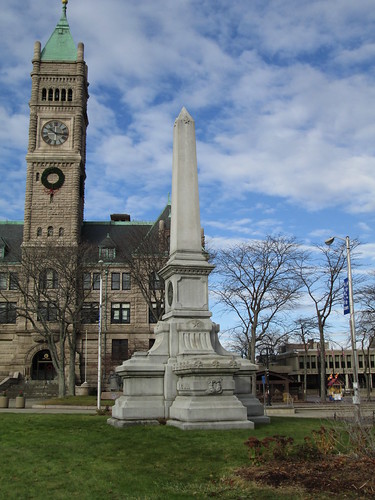
Ladd & Whitney Monument
Interesting connection Dick – Thanks. I toured the Petersen house the last time I was in Washington. It has become an impressive 4 story museum to the story of the assassination and aftermath.
I want to say something about the Ladd and Whitney monument; we always describe them as having been killed when a mob attacked their unit in the Baltimore Riots. It’s presented as a story of loss, a tragedy.
But what were they doing in Baltimore? The mission they were on, to relieve Washington, was a great success that saved the Union. General Butler’s march down the east coast did was a triumph. They reinforced the endangered capital; AND opened the land and sea routes from the north to Washington and the theater of war; AND kept the capital from being surrounded by hostile territory and forces; AND kept all the manpower of Maryland on the Union side.
Whitney and Ladd were not just a couple of poor bastards who got killed. They gave their lives as part of a great and successfully mission that had a tremendous effect on the war. Their story is not just one of tragedy and loss, but of accomplishment and success, albeit at a heavy cost. They are heros who helped save America.
So I interesting. Thanks so much
Is there any connection between William Clark and the shopkeeper Clark or Clark Rd?
https://www.ancestry.com/boards/thread.aspx?mv=flat&m=10223&p=surnames.clark
Sharon Hardy. I hope this helps. (Don’t know if it will…)
Joe – You’re absolutely correct about the importance of the 6th Mass rapidly reaching Washington. Because of the scope and carnage of the war, history has overlooked that and Ben Butler’s role in getting additional reinforcements to DC afterwards. I’ll write more about both in the coming days.
Sharyn – William Clark’s father, Tilton, worked for the Boston & Lowell Railroad. He was killed in a accident in the Boston rail yard right after William was born. I don’t think this Clark family had or built deep roots in Lowell.